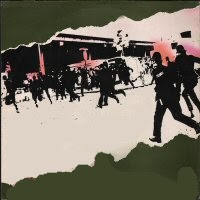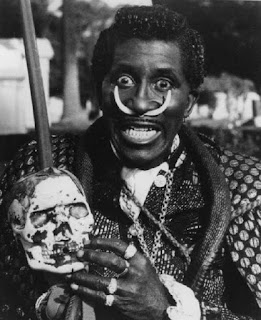Photo credits: Sex Pistols by Bob Gruen (1976)
and Jean Genet by Brassaï (1948)
Beauty is the projection of ugliness and to achieve harmony in bad taste
is the height of style ...
I.
Jean Genet (1910–1986) was a seminal French writer and political activist whose life was defined by his transition from a marginalized outcast to a celebrated avant-garde icon.
Born to a prostitute mother and placed into foster care, he spent his youth banged up in reformatories and prisons for crimes including theft and vagrancy [1], before joining the Foreign Legion at eighteen, from which he was dishonourably discharged on grounds of indecency (that is to say, well, I think we can all imagine what he was caught doing).
After this, Genet stole and slept his way round Europe as a tea leaf and rent boy, before ending up in and out of prison in Paris; experiences that served as the primary inspiration for his lyrical debut novel, Notre-Dame des Fleurs (1943) [2].
Genet's later work - which includes novels such as Journal du voleur (1949) [3] and plays such as Les Bonnes (1947) [4] - is renowned for its stylised (but uncompromising) exploration of power and the beauty of evil, as well as the subversion of social hierarchies and the transgression of traditional morality (often giving iconic status to outlaws and outcasts, punks and queers).
II.
Genet was championed by both Jean Cocteau and Jean-Paul Sartre [5] and, in his later years, following the events of May '68, he became increasingly active politically, advocating for all kinds of oppressed groups and radical causes and participating in various demonstrations.
In 1970, Genet spent three months in the United States at the invite of the Black Panthers, before then spending six months visiting Palestinian refugee camps in Jordan [6]. He also became pally with Foucault during this time and, in his experimental text Glas (1974), Jacques Derrida contrasted Genet's ideas on crime, homosexuality and all the reste with Hegel's philosophy, in order to deconstruct traditional concepts of the law, family, and the ideal of Wholeness (or the Absolute) [7].
Like Joe Strummer, Genet expressed solidarity with the Red Army
Faction (or Baader-Meinhof Gang); a militant far-left group designated as a terrorist organisation by the West German government, publishing an article titled Violence et brutalité in Le Monde (2 Sept. 1977) [8].
Whilst Strummer was, of course, simply posing in a T-shirt - the Clash specialised in radical chic - Genet was driven by a deep-seated hatred for Western imperialism and French bourgeois society in particular; in 1985, the year before his death, he informed a shocked interviewer from the BBC that he loathed France so much that he had even supported the Nazis when they invaded Paris.
III.
Whilst Genet never collaborated with the Sex Pistols - nor ever refer to them in his writings or interviews - it's tempting to imagine that he would have found McLaren and Westwood's tiny shop at 430 King's Road a conceptual space very much to his liking, promoting as it did anarchy, sexual deviance, and the kind of transgressive behaviour that he seemed so excited by.
And if we define the denizens of 430 King's Road as Peter York once famously defined them - "the extreme ideological wing of the peculiars" [9] - or, alternatively, recall the description of them from the trailer to The Great Rock 'n' Roll Swindle (1980) - "a kamikaze gang of cat burglers and child prostitutes" [10] - then it's possible that Genet would have identified with the Sex Pistols and acknowledged how his legacy found youthful expression via punk [11].
But, again, just to be clear - there is no evidence
of a direct relationship between Jean Genet and the Sex Pistols and I don't remember Malcolm ever mentioning his name, whereas he would often refer to other poets and playwrights he admired, such as Oscar Wilde and Joe Orton. The speculative connection suggested here is largely based on the fact that both McLaren and Genet understood style as a form of refusal and aligned themselves with the counterculture.
On the other hand, however, it's worth noting that while Genet may have appreciated the SEX and Seditionaries aesthetic, by the mid-1970s he had become increasingly cynical about art and theatrical rebellion and so it's possible that he would have dismissed punk as just another fashion and commercial commodification, rather than something genuinely subversive or dangerous - who knows?
Notes
[1] Genet's mother raised him for the first seven
months of his life before placing him for adoption (one likes to believe she did so with good intentions and was putting the child's interests first). According to his biographer, his foster family was loving and
attentive. Neverthless, his childhood
involved numerous attempts to run away and incidents of petty criminality (even whilst the obviously bright boy got good grades at school). Eventually, aged fifteen, Genet was sent to a brutal penal colony, where he spent three unhappy years.
[2] The first English edition, trans. Bernard Frechtman, was published as Our Lady of the Flowers in 1949.
[3] The first English edition, trans. Bernard Frectman, was published as The Thief's Journal (1964).
[4] This work was again first translated into English by Bernard Frechtman and was published as The Maids by Grove Press in the United States (1954), and by Faber in the UK (1957). A famous film adaptation, dir. Christopher Miles and starring Glenda Jackson and Susannah York, was released in cinemas in 1975.
[5] When Genet arrived in Paris, he sought out and introduced himself to Jean Cocteau and the
latter, impressed by his writing, used his contacts to help get
Genet's first novel published.
Later, in 1949, when Genet was threatened with a life sentence
after notching up ten convictions, Cocteau and other prominent intellectuals, including
Jean-Paul Sartre, successfully petitioned the French
President to have the sentence set aside. In gratitude - and perhaps realising there was more money to be made from art than crime - Genet stayed on the straight and narrow after this (or, at any rate, he avoided being caught doing anything that might return him to a prison cell).
By this date, Genet had completed five novels, three plays, and numerous
poems, many controversial for their explicit and often deliberately
provocative portrayal of homosexuality and criminality. In 1952, Sartre
wrote a long analysis of Genet's existential development (from vagrant
to writer), entitled Saint Genet. Profoundly affected by
Sartre's analysis, Genet did not write for the next five years, during which time he became emotionally
attached to Abdallah Bentaga, a tightrope walker. Following Bentaga's suicide in 1964, Genet entered a period of
depression and attempted to end his own life.
[6] A memoir detailing his encounters with Palestinian fighters and Black Panthers was published posthumously; see Un captif amoureux (Gallimard, 1986). Translated into English by Barbara Bray and with an
introduction by Edmund White, it was published by Picador as The Prisoner of Love (1989).
[7] The English translation of Derrida's book, by John P. Leavey, Jr. and Richard Rand, was published by the University of Nebraska Press, in 1986. A more recent translation, by Geoffrey Bennington and David Wills, was published with the title Clang by the University of Minnesota Press in 2021.
[8] This Le Monde piece can be found in Jean Genet, The Declared Enemy: Texts and Interviews, ed. Albert Dichy, trans. Jeff Fort (Stanford University Press, 2004), pp. 171-177.
According to the blurb for this book, Genet affirms a heroic politics of protest and revolt with "an uncompromising outrage". In other words, it's that depressing mix of militant asceticism and pathological narcissism that I genuinely despise. In fact, the only thing I hate Genet for more is his reported sexual abuse of the eleven-year-old daughter of his friend and fellow writer Monique Lange. Viewers interested in knowing more about this should see the unconventional docu-drama Little Girl Blue (2023), written and directed by Mona Achache, and starring Marion Cottilard: click here to watch the trailer.
[9] This wonderful description of McLaren and company was coined by Peter York in an article entitled 'Them' which appeared in Harpers & Queen (October 1976). It was quoted by Paul Gorman in The Life and Times of Malcolm McLaren (Constable, 2020), p. 329.
[10] Click here to watch the trailer to The Great Rock 'n' Roll Swindle (dir. Julien Temple, 1980); the film that incriminates its audience. The narrator is the famous BBC newsreader John Snagge.
[11] Of all the Sex Pistols, I think it would have been guitarist Steve
Jones whom the Frenchman would have found the most appealing. For as
Glen Matlock once rightly observed, it was Jones who was the true
spirit of the band and "like a character out of Jean Genet book [...] a
real livewire scoundrel, unabashedly so".
Matlock was speaking in an interview with Matt Catchpole; see 'Trigger Happy - Sex Pistol Glen Matlock on Life as a Solo Performer and New Album Good To Go' (26 June, 2018): click here. Matlock later repeats this observation in an interview with Dave Steinfeld; see 'Glen Matlock - Truth or Consequences: Talking with the original Sex Pistol about politics and punk rock', on the website Rock and Roll Globe (18 May 2023): click here.
For a sister post to this one on Joe Orton, click here.
Musical bonus: Sex Pistols, 'L'Anarchie Pour Le UK', from the album The Great Rock n' Roll Swindle (Virgin Records, 1979), uploaded to YouTube by Universal Music Group: click here. The vocalist is Loius Brennon and he is backed by his merry band of street musicians on accordian and fiddle.












.jpeg)
.jpg)
